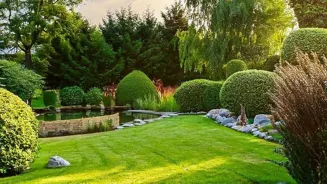Discover 5 Essential Tips for a Sustainable Garden in Your Backyard! Dive into creating an eco-friendly oasis
Namaste, readers! Are you thinking of making your own little garden but also wanting to be kind
to Mother Earth? Well, you've come to the right place! A sustainable garden isn't just about pretty flowers and tasty vegetables; it's about creating a mini-ecosystem that works in harmony with nature.
It's good for the environment, saves you money and gives you the satisfaction of growing your own food and flowers without harming the planet. Let's dive into five easy-peasy tips to create your very own sustainable garden in your backyard!
Native plants support local ecosystem, conserve water, and reduce pollution
Forget fancy foreign flowers! The real beauty lies in native plants. These are plants that naturally belong to your region. They're perfectly adapted to the local climate, soil, and even the local insects! Why are they so important for a sustainable garden?
Firstly, they require way less water than non-native plants. Think about it: they’ve evolved to thrive in your area's rainfall patterns. Secondly, they need less fertilizer and pesticides. Because they're already used to the soil and the local pests, they're naturally more resilient.
Thirdly, they attract local pollinators like bees and butterflies, which are essential for a healthy garden and a healthy planet! Find out which plants are native to your area from your local nursery or online resources.
By choosing native plants, you're not just creating a beautiful garden, you're supporting the local ecosystem and helping to conserve water and reduce pollution. Moreover, you'll find that native plants often have a unique charm and beauty that reflects the natural landscape of your area.
And they're usually easier to care for, which means less work for you! So, say goodbye to high-maintenance gardens and hello to a thriving, sustainable ecosystem right in your backyard!
Replace exotic plants with native for healthier gardens
Make a conscious effort to replace some of your exotic varieties of plants with native ones and see the difference. Your garden and the local environment will thank you for it!
Composting turns waste into plant food for sustainable gardens
Composting is like magic! You take kitchen scraps and yard waste and turn them into nutrient-rich food for your plants. It's an absolute must for any sustainable garden.
Instead of throwing away those vegetable peels, coffee grounds, and fallen leaves, you can transform them into a valuable resource.
Composting reduces waste, lowers emissions, and enriches soil
Why is composting so important? Well, it reduces the amount of waste going to landfills, which helps to reduce greenhouse gas emissions. It also creates a natural fertilizer that's full of beneficial nutrients for your plants.
This means you can use less chemical fertilizers, which are harmful to the environment. Setting up a compost bin is easier than you think. You can buy a ready-made bin or simply create a pile in a corner of your yard.
Just remember to mix "green" materials like vegetable scraps with "brown" materials like dried leaves and twigs.
Compost for healthy plants and garden sustainability
Turn the pile regularly to aerate it, and keep it moist but not soggy. With a little patience, you'll have a rich, dark compost that your plants will absolutely love.
Adding compost to your garden soil improves its structure, helps it retain moisture, and provides essential nutrients for healthy plant growth. Plus, it's a great feeling knowing that you're recycling your waste and creating something valuable for your garden.
So, start composting today and watch your garden flourish!
Efficient gardening tips for water conservation in India
Water is precious, especially in many parts of India. Sustainable gardening is all about using water efficiently and avoiding wastage. There are several ways to water your garden wisely. Firstly, water deeply and less frequently.
This encourages plants to develop deep roots, making them more drought-tolerant. Secondly, water in the early morning or late evening to minimize evaporation. Avoid watering during the hottest part of the day when most of the water will simply evaporate before it can reach the roots.
Thirdly, consider using a drip irrigation system or soaker hoses. These methods deliver water directly to the roots of the plants, reducing water loss. Rainwater harvesting is another fantastic way to conserve water. Collect rainwater in barrels or tanks and use it to water your garden.
Not only is rainwater free, but it's also better for your plants than tap water, as it doesn't contain chlorine or other chemicals. Mulching is also crucial for water conservation. Applying a layer of mulch around your plants helps to retain moisture in the soil and reduces evaporation.
You can use organic mulches like straw, wood chips, or shredded leaves. Remember to group plants with similar water needs together. This way, you can water them more efficiently without overwatering some plants and underwatering others.
By implementing these water-wise strategies, you can save water, reduce your water bill, and create a thriving garden, even during dry spells.
In a sustainable garden, avoid harmful chemicals, use natural methods for fertilizers and pest control
In a sustainable garden, we avoid using harmful chemical fertilizers and pesticides. These chemicals can pollute the soil, water, and air and can harm beneficial insects and other wildlife. Instead, opt for natural and organic alternatives.
For fertilizers, use compost, manure, or organic fertilizers. These provide plants with the nutrients they need without harming the environment. To control pests, try natural methods like attracting beneficial insects like ladybugs and lacewings, which prey on common garden pests.
You can also use homemade pest control sprays made from ingredients like neem oil, garlic, or chilli. Companion planting is another effective way to deter pests. Planting certain plants together can help to repel pests or attract beneficial insects.
For example, planting marigolds near tomatoes can help to deter nematodes. Regularly inspect your plants for signs of pests or diseases and address problems early before they become major infestations. Remove any affected leaves or plants to prevent the spread of disease.
Weeding is an essential part of organic gardening. Remove weeds regularly to prevent them from competing with your plants for nutrients and water. Mulching can also help to suppress weed growth.
By using natural and organic methods, you can create a healthy and thriving garden without harming the environment or your health. You'll also attract beneficial insects and other wildlife to your garden, creating a more vibrant and balanced ecosystem.
Pollinators are crucial for gardens; create a pollinator-friendly space to support them
Pollinators like bees, butterflies, and other insects are essential for a healthy garden. They help to pollinate flowers, which is necessary for the production of fruits and vegetables. Unfortunately, pollinator populations are declining due to habitat loss and pesticide use.
You can help to support pollinators by creating a pollinator-friendly garden. Plant a variety of flowering plants that bloom at different times of the year to provide pollinators with a continuous source of food. Choose plants with different shapes and colors to attract a wide range of pollinators.
Native plants are particularly attractive to native pollinators. Avoid using pesticides, which can harm or kill pollinators. If you must use pesticides, choose organic options and apply them in the evening when pollinators are less active.
Provide a source of water for pollinators, such as a shallow dish of water with pebbles for them to land on. Create nesting sites for pollinators, such as bee hotels or patches of bare ground for ground-nesting bees.
Educate yourself and others about the importance of pollinators and how to protect them. By creating a pollinator-friendly garden, you can help to support these essential creatures and ensure the health and productivity of your garden.
You'll also enjoy the beauty and activity that pollinators bring to your backyard.
Creating a sustainable garden is a continuous journey of learning and growth
Creating a sustainable garden is a journey, not a destination. Start small, experiment, and learn as you go. Every little effort makes a difference. Happy gardening!
AI Generated Content. Glance/InMobi shall have no liability for the content













